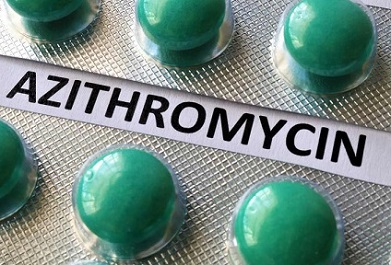Breaking News! Azithromycin Induces Asthma Remission In Groundbreaking Australian Clinical Trial
Nikhil Prasad Fact checked by:Thailand Medical News Team May 08, 2024 11 months, 2 weeks, 4 days, 17 hours, 15 minutes ago
Med News: In a groundbreaking development, researchers at HMRI (Hunter Medical Research Institute) and the University of Newcastle have conducted a randomized clinical trial that showcases the potential of azithromycin, a macrolide antibiotic, to induce remission in moderate to severe asthma cases. The study, led by Professor Peter Gibson from the HMRI Asthma and Breathing program and Dr Dennis Thomas, marks a significant shift in asthma treatment paradigms.
 Azithromycin Induces Asthma Remission In Groundbreaking Australian Clinical Trial
Understanding Asthma Remission
Azithromycin Induces Asthma Remission In Groundbreaking Australian Clinical Trial
Understanding Asthma Remission
Asthma is a prevalent chronic respiratory condition affecting more than 300 million people globally, posing substantial health and economic challenges. Traditionally managed through standard therapies like inhaled corticosteroids and long-acting beta-agonists, the concept of achieving remission in asthma has gained traction in recent years. Remission entails attaining a high level of disease control and eliminating exacerbations for an extended period, with or without ongoing treatment.
Biologics vs. Azithromycin: A New Approach
Biologics, while effective in certain asthma subtypes like Th2 high asthma, are costly and not universally accessible. Azithromycin, on the other hand, offers a low-cost, oral therapeutic alternative. The study's primary aim was to assess if azithromycin could induce remission in persistent uncontrolled asthma cases, including both Th2 high and Th2 low asthma phenotypes.
Study Design and Methodology
The whole research, known as the Asthma and Macrolides: Azithromycin Efficacy and Safety (AMAZES) trial, employed a rigorous randomized, double-blind, placebo-controlled design and the findings are covered in this
Med News report.
The study involved a secondary analysis of the AMAZES clinical trial, a double-blind placebo-controlled trial that evaluated azithromycin's safety and efficacy in asthma exacerbations. The trial included 335 participants with persistent uncontrolled asthma who completed the 12-month treatment period. Researchers employed stringent remission criteria, including zero exacerbations, zero oral corticosteroids for six months, and an Asthma Control Questionnaire (ACQ) score ≤ 1 at 12 months.
Results: Azithromycin's Remarkable Impact
The results were striking. Over 50% of participants treated with azithromycin achieved clinical remission, a significantly higher rate than the placebo group (50.6% vs. 38.9%, P = .032). Furthermore, a higher proportion of the azithromycin group achieved clinical remission plus lung function criteria (50.8% vs. 37.1%, P = .029) compared to placebo. Additionally, a higher proportion of the azithromycin group achieved complete remission (23% vs. 13.7%, P = .058). Sensitivity analyses supported these findings, indicating the robustness of the study outcomes.
Professor Gibson expressed optimism regarding the study's outcomes. "Remissi
on among adult asthma patients is a relatively nascent concept that has received limited research attention but has recently garnered considerable interest," noted Professor Gibson. He highlighted recent studies indicating the possibility of remission in severe asthma cases treated with highly efficacious biologic therapies, a novel drug class.
The significance of this research lies in its departure from the conventional reliance on biologics, which are injectable medications. These biologics, while effective, present cost barriers in low- and middle-income nations, with monthly expenses ranging from approximately US$500 to US$3000. Moreover, they are typically reserved for the most severe asthma cases in high-income regions. In stark contrast, azithromycin, the drug under examination, is an economical oral therapy, costing around US$15 per week. Dr Dennis Thomas, the lead author, underscored the broad implications of these findings.
"The achievement of remission carries immense health and economic advantages, as it completely eradicates exacerbations, ensures full symptom control, and eliminates the necessity for hazardous medications like corticosteroids," Dr Thomas emphasized. He further advocated for future asthma treatments to prioritize remission as a therapeutic goal, given its transformative impact on patient outcomes and healthcare costs.
Implications and Future Directions
The findings have far-reaching implications. Achieving remission not only abolishes exacerbations but also eliminates the need for high-risk medications like corticosteroids, presenting substantial health and economic benefits. The study's success lays the groundwork for redefining asthma treatment goals towards achieving remission. This could potentially revolutionize asthma management strategies, particularly for patients with persistent uncontrolled asthma.
Challenges and Considerations
While the study heralds a new era in asthma management, challenges such as antimicrobial resistance and potential side effects of long-term azithromycin use necessitate cautious consideration. Future research should explore the long-term effects of azithromycin-induced remission, disease relapse dynamics, and impacts on underlying asthma pathology.
Conclusion
The Australian clinical trial's success in inducing asthma remission with azithromycin represents a paradigm shift in asthma care. As the medical community embraces this new approach, the pursuit of remission as a therapeutic goal gains momentum, offering hope for improved outcomes and reduced burdens for asthma patients worldwide. This groundbreaking study paves the way for further research and innovation in asthma management, emphasizing the importance of personalized and effective treatments tailored to individual patient needs
The study findings were published in the peer reviewed Chest Journal.
https://journal.chestnet.org/article/S0012-3692(24)00284-8/fulltext
For the latest
Med News, keep on logging to Thailand Medical News.
